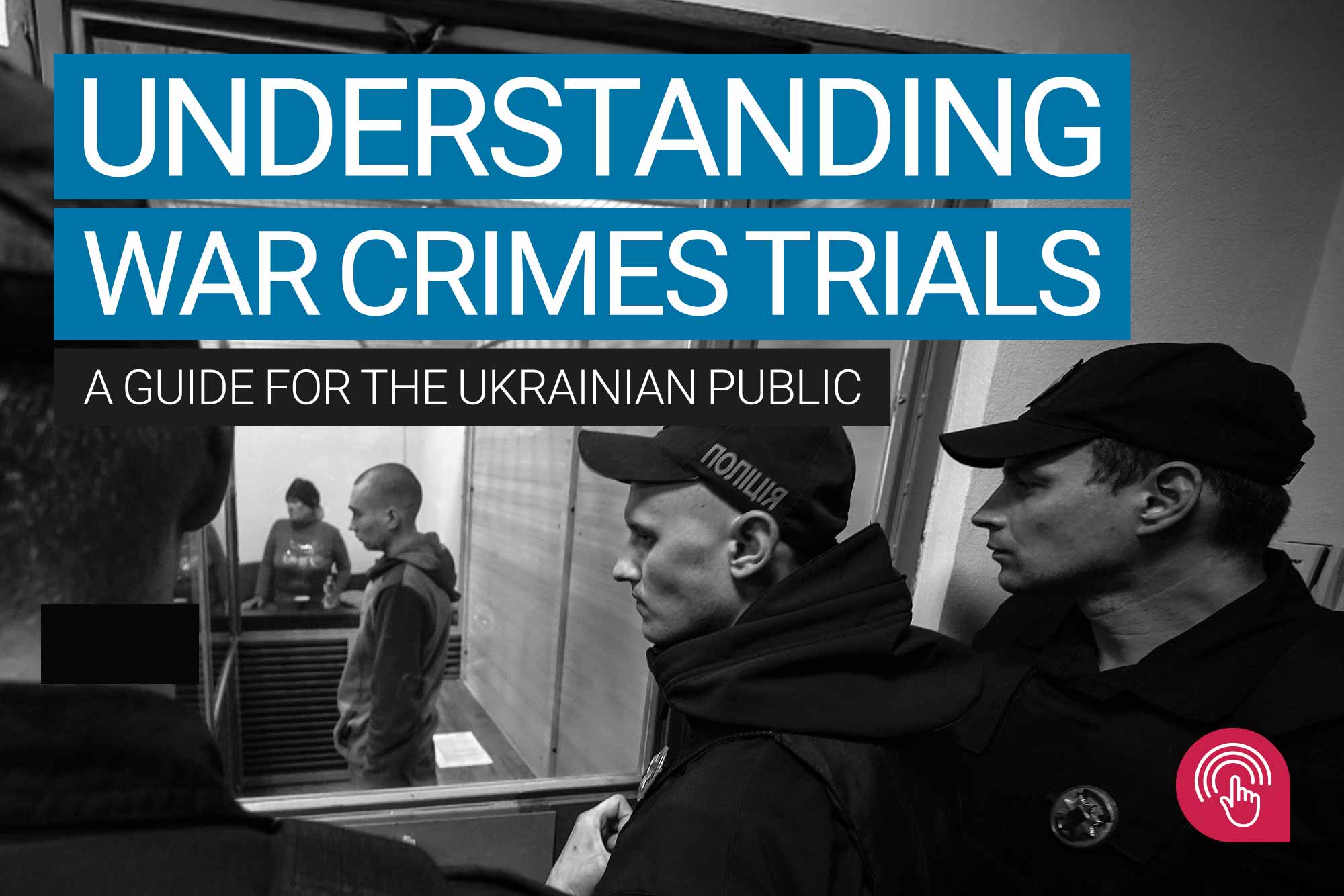“Achieving Justice Means Punishing the Guilty”
IWPR guide to understanding war crimes trials launches in Kyiv.
“Achieving Justice Means Punishing the Guilty”
IWPR guide to understanding war crimes trials launches in Kyiv.
As Ukraine investigates more than 150,000 cases of potential war crimes - with international justice efforts also underway - public understanding and support for these often-complex judicial proceedings remains key.
Journalists, human rights defenders, legal experts and diplomats were amongst the attendees at the Kyiv launch of a new IWPR guide that provides a user-friendly resource for Ukrainians to understand and access these ongoing processes.
With a foreword from Nobel Peace prizewinner and IWPR international board member Oleksandra Matviichuk, the publication provides a concise and accessible overview of central concepts, from legal definitions and the basic structure of investigation to the importance of public awareness and victim support. It also explores how civil society and the media play a vital role in documenting war crimes cases.

Yurii Bilousov, head of the war department of the Prosecutor General’s Office of Ukraine, told the April 16 event - held at the Ukrinform national news agency offices in Kyiv and live streamed on social media - that a whole-of-society approach was important to achieve justice.
“I would really like us all to understand that no one, neither the International Criminal Court nor the Intergalactic Commission for Justice, will solve our problems,” Bilousov continued. “We say, ‘colleagues, 99.9 per cent of all cases will be in our courts, regardless of whether we like our judges and prosecutors or not. Let’s put our affairs in order together.’”
Panellists discussed strategies for preserving memory, improving legal processes and ensuring continued international support for Ukraine's efforts to achieve justice.
Natalia Gumenyuk, journalist and co-founder of the Reckoning Project, stressed that building partnerships with the media was vital. It was imperative for the courts to maintain transparency and access for journalists and the public during war crimes trials, unless there were specific security concerns.
“I have heard our colleagues from the police and the prosecutor’s office say…’You know, if there is no journalistic article, the case will most likely not be paid attention to, it may not be solved, so write and report.’ So we are all connected here,” Gumenyuk said.
The guide, published in both English and Ukrainian, was produced as part of the Ukraine Justice Report project, funded by the UK’s Foreign, Commonwealth and Development office. The project trains and mentors local Ukrainian journalists to produce accurate court reporting and coverage, as well as publishing dedicated analysis, interviews and news features on key ongoing justice issues.
The latest body of trainees attended the event, including Oksana Matsiopa, a journalist from Ternopil, who emphasised the importance of reporting on war crimes justice processes.
“If Ukrainians keep this context on the agenda and are informed about the trials and what’s happening, then we will be able to convey this to our foreign readers, listeners, and audiences,” she said. “If we forget this here (in Ukraine), then no one else will be interested in it.”
The guide’s author Oksana Maksymenyuk, a lawyer at the Institute for the Development of Regional Press, said that greater public understanding of the processes involved would lead to wider access to justice.
"In addition to almost 160,000 officially registered war crimes, there are still many in Ukraine who have not applied [to the courts],” she told the event, “This applies to those who left after the occupation, as well as those who are currently in the occupied territories. These are territories for which it is impossible to receive statements about the commission of crimes or conduct an investigation… We tried to show in this manual how the process should take place.”
Journalists present said that they would use the new manual on covering war crimes trials to improve the accuracy and context of their reporting, with especial awareness of the potential for re-traumatisation when interviewing or reporting on survivors.
Attendees agreed that state bodies and civil society need to work to improve communication with the public on investigations and trials, with justice processes forming an important element in national healing and unity.
"We must remember that achieving justice means punishing the guilty,” Maksymenyuk stressed. “Otherwise, society will lose faith [and ask], why turn to law enforcement agencies?"
